Support Work in Social Care: Roles, Skills, and Management
VerifiedAdded on 2020/06/06
|6
|1687
|47
Report
AI Summary
This report provides a comprehensive overview of the roles and responsibilities of non-direct care workers within the social care sector, using the National Health Service (NHS) of the UK as a case study. It explores the various functions these workers perform, including administrative tasks, patient support, and maintenance duties, highlighting their importance in creating a supportive environment for patients. The report details the necessary interpersonal skills, such as communication and empathy, required for effective patient interaction and teamwork. It further examines the roles of these workers in team operations, emphasizing their contribution to maintaining health, safety, and security within care settings. The importance of supervision and management in the development and motivation of non-direct care workers is also discussed, concluding with the overall significance of their contributions to the social care sector. The report emphasizes the importance of team work and implementation of various policies to ensure health and safety of the patients. It also mentions the significance of supervision and management in the development of non-direct care workers.
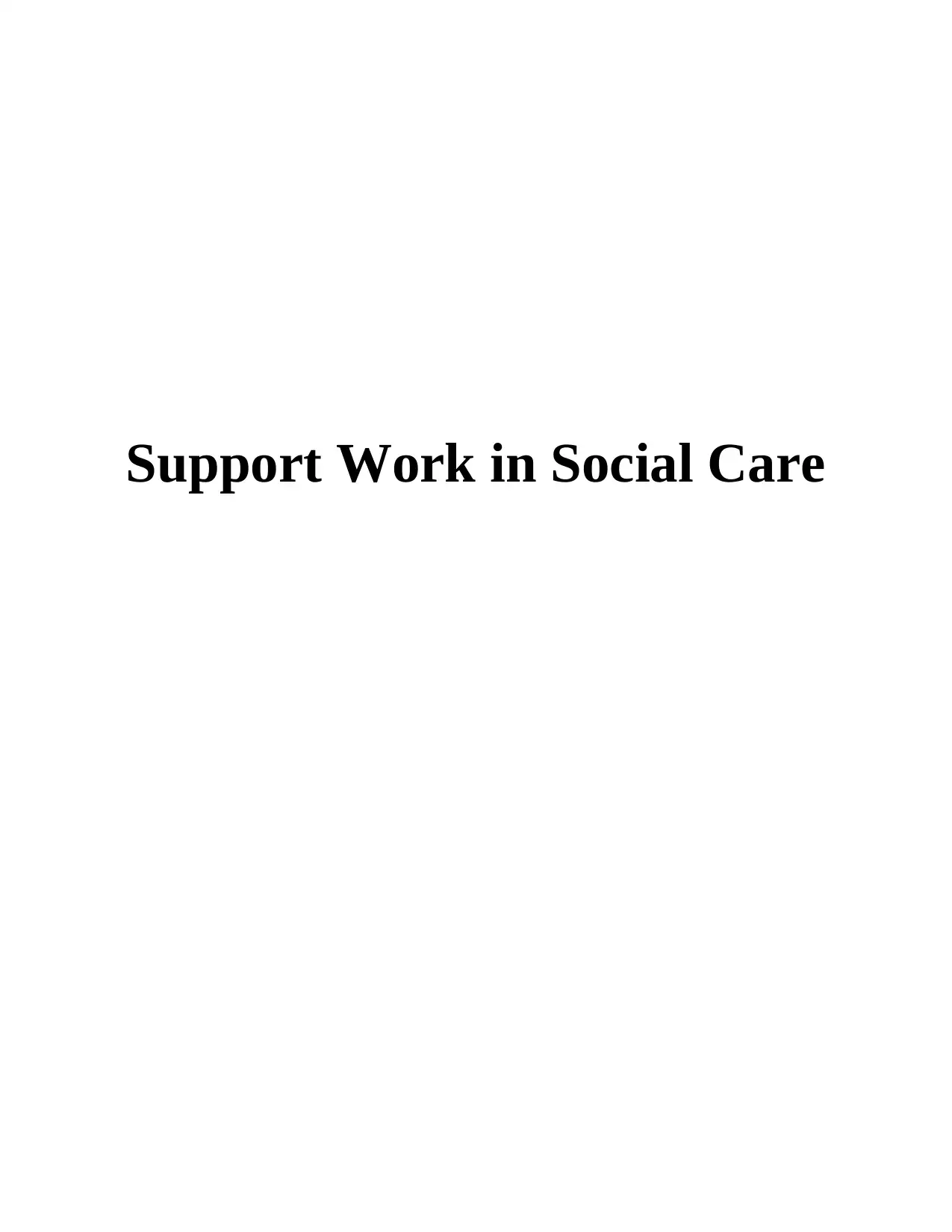
Support Work in Social Care
Paraphrase This Document
Need a fresh take? Get an instant paraphrase of this document with our AI Paraphraser
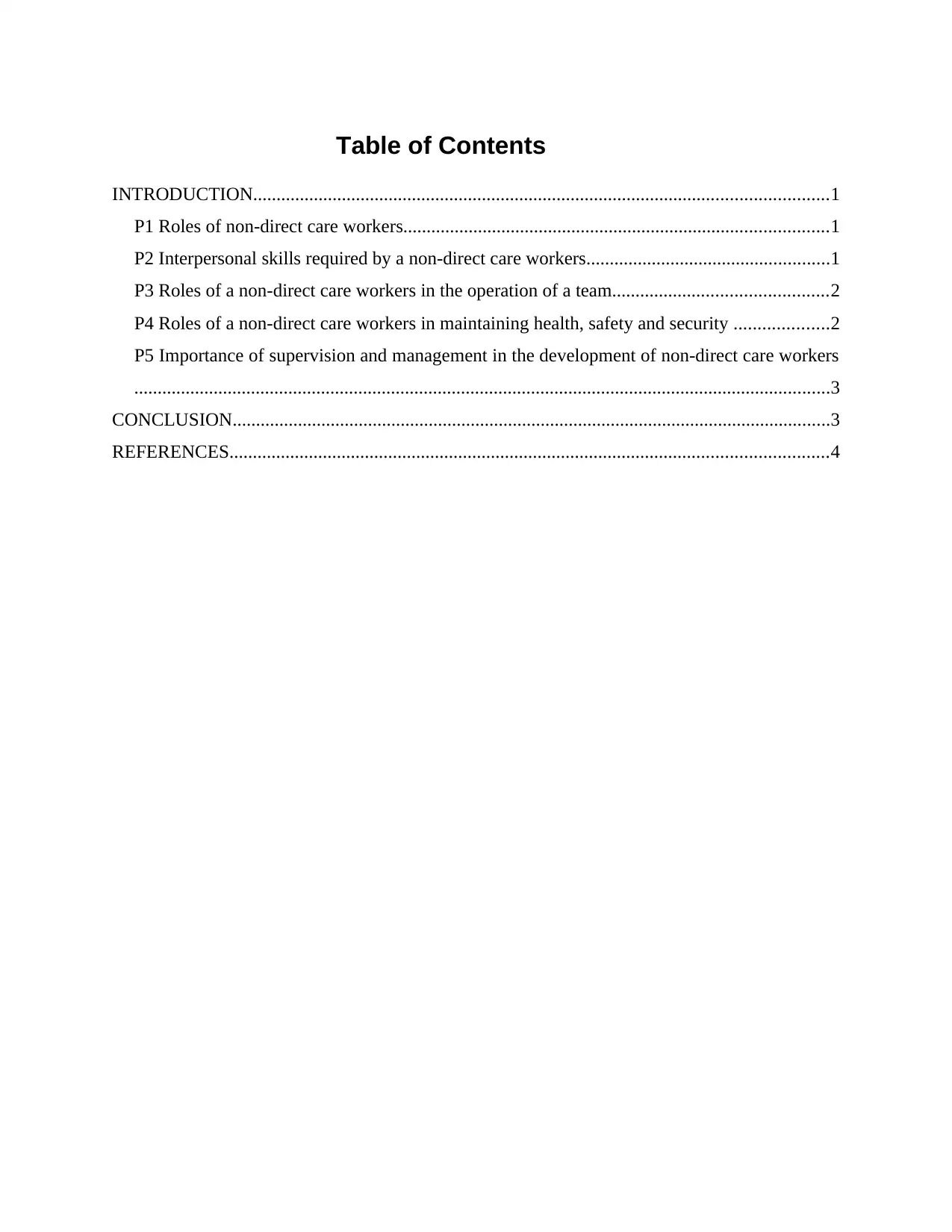
Table of Contents
INTRODUCTION...........................................................................................................................1
P1 Roles of non-direct care workers...........................................................................................1
P2 Interpersonal skills required by a non-direct care workers....................................................1
P3 Roles of a non-direct care workers in the operation of a team..............................................2
P4 Roles of a non-direct care workers in maintaining health, safety and security ....................2
P5 Importance of supervision and management in the development of non-direct care workers
.....................................................................................................................................................3
CONCLUSION................................................................................................................................3
REFERENCES................................................................................................................................4
INTRODUCTION...........................................................................................................................1
P1 Roles of non-direct care workers...........................................................................................1
P2 Interpersonal skills required by a non-direct care workers....................................................1
P3 Roles of a non-direct care workers in the operation of a team..............................................2
P4 Roles of a non-direct care workers in maintaining health, safety and security ....................2
P5 Importance of supervision and management in the development of non-direct care workers
.....................................................................................................................................................3
CONCLUSION................................................................................................................................3
REFERENCES................................................................................................................................4
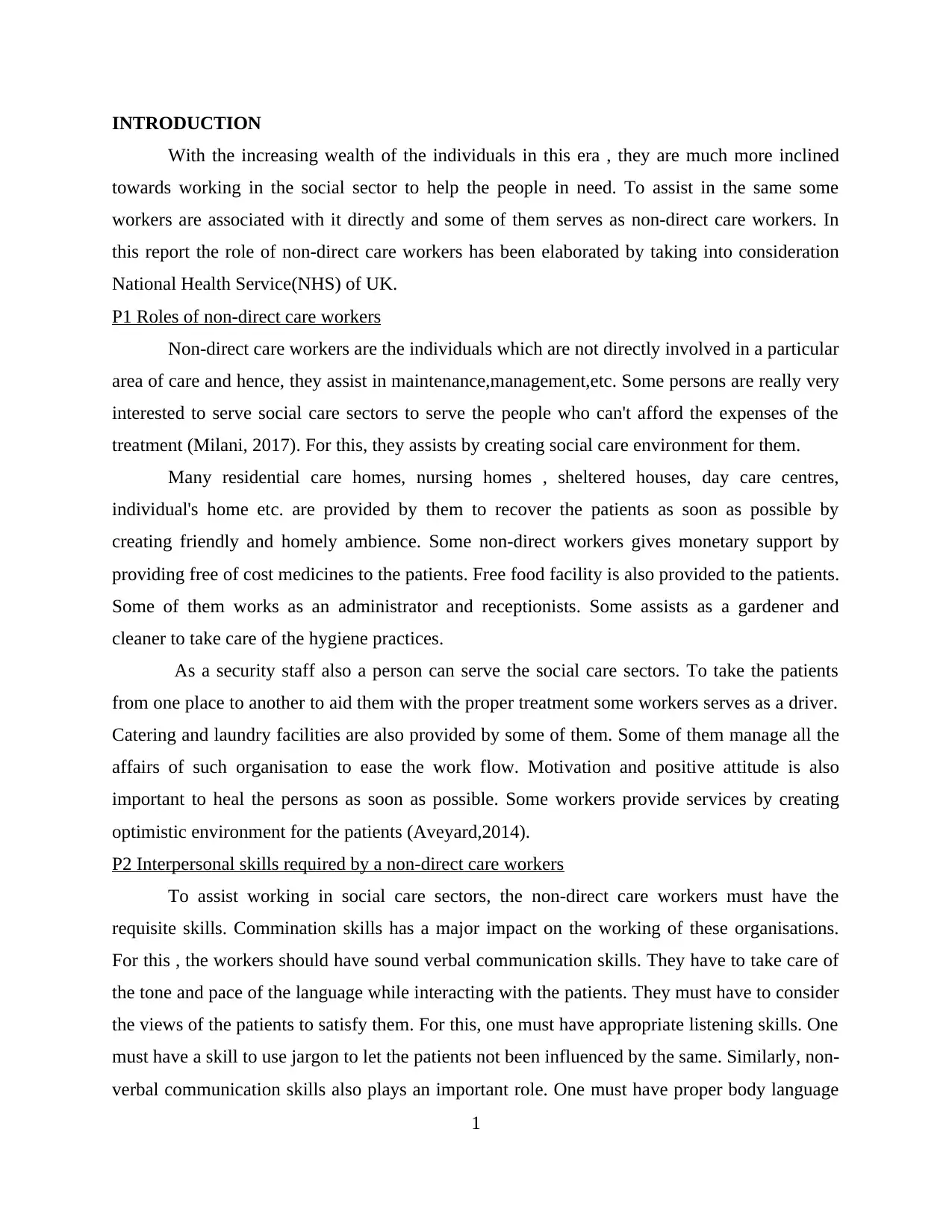
INTRODUCTION
With the increasing wealth of the individuals in this era , they are much more inclined
towards working in the social sector to help the people in need. To assist in the same some
workers are associated with it directly and some of them serves as non-direct care workers. In
this report the role of non-direct care workers has been elaborated by taking into consideration
National Health Service(NHS) of UK.
P1 Roles of non-direct care workers
Non-direct care workers are the individuals which are not directly involved in a particular
area of care and hence, they assist in maintenance,management,etc. Some persons are really very
interested to serve social care sectors to serve the people who can't afford the expenses of the
treatment (Milani, 2017). For this, they assists by creating social care environment for them.
Many residential care homes, nursing homes , sheltered houses, day care centres,
individual's home etc. are provided by them to recover the patients as soon as possible by
creating friendly and homely ambience. Some non-direct workers gives monetary support by
providing free of cost medicines to the patients. Free food facility is also provided to the patients.
Some of them works as an administrator and receptionists. Some assists as a gardener and
cleaner to take care of the hygiene practices.
As a security staff also a person can serve the social care sectors. To take the patients
from one place to another to aid them with the proper treatment some workers serves as a driver.
Catering and laundry facilities are also provided by some of them. Some of them manage all the
affairs of such organisation to ease the work flow. Motivation and positive attitude is also
important to heal the persons as soon as possible. Some workers provide services by creating
optimistic environment for the patients (Aveyard,2014).
P2 Interpersonal skills required by a non-direct care workers
To assist working in social care sectors, the non-direct care workers must have the
requisite skills. Commination skills has a major impact on the working of these organisations.
For this , the workers should have sound verbal communication skills. They have to take care of
the tone and pace of the language while interacting with the patients. They must have to consider
the views of the patients to satisfy them. For this, one must have appropriate listening skills. One
must have a skill to use jargon to let the patients not been influenced by the same. Similarly, non-
verbal communication skills also plays an important role. One must have proper body language
1
With the increasing wealth of the individuals in this era , they are much more inclined
towards working in the social sector to help the people in need. To assist in the same some
workers are associated with it directly and some of them serves as non-direct care workers. In
this report the role of non-direct care workers has been elaborated by taking into consideration
National Health Service(NHS) of UK.
P1 Roles of non-direct care workers
Non-direct care workers are the individuals which are not directly involved in a particular
area of care and hence, they assist in maintenance,management,etc. Some persons are really very
interested to serve social care sectors to serve the people who can't afford the expenses of the
treatment (Milani, 2017). For this, they assists by creating social care environment for them.
Many residential care homes, nursing homes , sheltered houses, day care centres,
individual's home etc. are provided by them to recover the patients as soon as possible by
creating friendly and homely ambience. Some non-direct workers gives monetary support by
providing free of cost medicines to the patients. Free food facility is also provided to the patients.
Some of them works as an administrator and receptionists. Some assists as a gardener and
cleaner to take care of the hygiene practices.
As a security staff also a person can serve the social care sectors. To take the patients
from one place to another to aid them with the proper treatment some workers serves as a driver.
Catering and laundry facilities are also provided by some of them. Some of them manage all the
affairs of such organisation to ease the work flow. Motivation and positive attitude is also
important to heal the persons as soon as possible. Some workers provide services by creating
optimistic environment for the patients (Aveyard,2014).
P2 Interpersonal skills required by a non-direct care workers
To assist working in social care sectors, the non-direct care workers must have the
requisite skills. Commination skills has a major impact on the working of these organisations.
For this , the workers should have sound verbal communication skills. They have to take care of
the tone and pace of the language while interacting with the patients. They must have to consider
the views of the patients to satisfy them. For this, one must have appropriate listening skills. One
must have a skill to use jargon to let the patients not been influenced by the same. Similarly, non-
verbal communication skills also plays an important role. One must have proper body language
1
⊘ This is a preview!⊘
Do you want full access?
Subscribe today to unlock all pages.

Trusted by 1+ million students worldwide
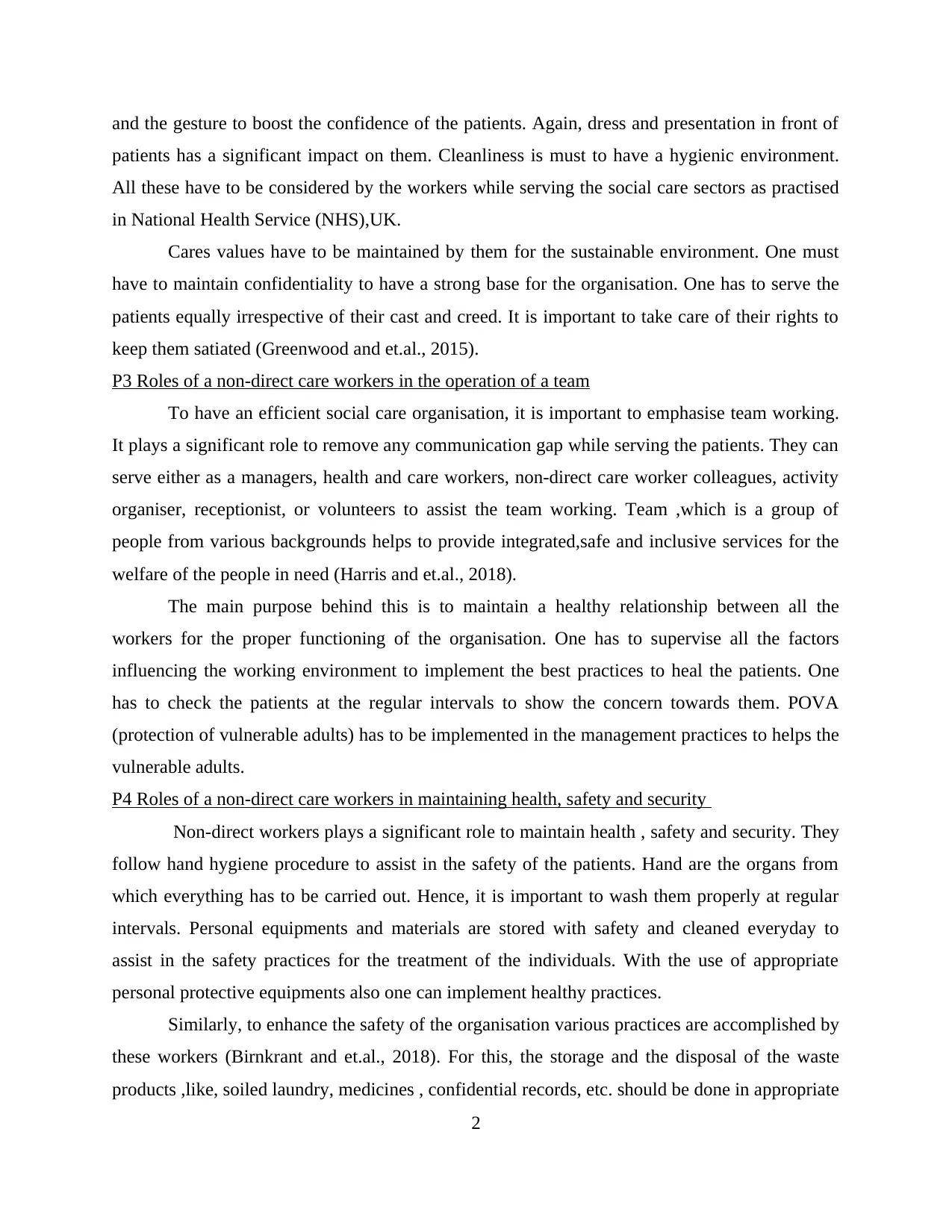
and the gesture to boost the confidence of the patients. Again, dress and presentation in front of
patients has a significant impact on them. Cleanliness is must to have a hygienic environment.
All these have to be considered by the workers while serving the social care sectors as practised
in National Health Service (NHS),UK.
Cares values have to be maintained by them for the sustainable environment. One must
have to maintain confidentiality to have a strong base for the organisation. One has to serve the
patients equally irrespective of their cast and creed. It is important to take care of their rights to
keep them satiated (Greenwood and et.al., 2015).
P3 Roles of a non-direct care workers in the operation of a team
To have an efficient social care organisation, it is important to emphasise team working.
It plays a significant role to remove any communication gap while serving the patients. They can
serve either as a managers, health and care workers, non-direct care worker colleagues, activity
organiser, receptionist, or volunteers to assist the team working. Team ,which is a group of
people from various backgrounds helps to provide integrated,safe and inclusive services for the
welfare of the people in need (Harris and et.al., 2018).
The main purpose behind this is to maintain a healthy relationship between all the
workers for the proper functioning of the organisation. One has to supervise all the factors
influencing the working environment to implement the best practices to heal the patients. One
has to check the patients at the regular intervals to show the concern towards them. POVA
(protection of vulnerable adults) has to be implemented in the management practices to helps the
vulnerable adults.
P4 Roles of a non-direct care workers in maintaining health, safety and security
Non-direct workers plays a significant role to maintain health , safety and security. They
follow hand hygiene procedure to assist in the safety of the patients. Hand are the organs from
which everything has to be carried out. Hence, it is important to wash them properly at regular
intervals. Personal equipments and materials are stored with safety and cleaned everyday to
assist in the safety practices for the treatment of the individuals. With the use of appropriate
personal protective equipments also one can implement healthy practices.
Similarly, to enhance the safety of the organisation various practices are accomplished by
these workers (Birnkrant and et.al., 2018). For this, the storage and the disposal of the waste
products ,like, soiled laundry, medicines , confidential records, etc. should be done in appropriate
2
patients has a significant impact on them. Cleanliness is must to have a hygienic environment.
All these have to be considered by the workers while serving the social care sectors as practised
in National Health Service (NHS),UK.
Cares values have to be maintained by them for the sustainable environment. One must
have to maintain confidentiality to have a strong base for the organisation. One has to serve the
patients equally irrespective of their cast and creed. It is important to take care of their rights to
keep them satiated (Greenwood and et.al., 2015).
P3 Roles of a non-direct care workers in the operation of a team
To have an efficient social care organisation, it is important to emphasise team working.
It plays a significant role to remove any communication gap while serving the patients. They can
serve either as a managers, health and care workers, non-direct care worker colleagues, activity
organiser, receptionist, or volunteers to assist the team working. Team ,which is a group of
people from various backgrounds helps to provide integrated,safe and inclusive services for the
welfare of the people in need (Harris and et.al., 2018).
The main purpose behind this is to maintain a healthy relationship between all the
workers for the proper functioning of the organisation. One has to supervise all the factors
influencing the working environment to implement the best practices to heal the patients. One
has to check the patients at the regular intervals to show the concern towards them. POVA
(protection of vulnerable adults) has to be implemented in the management practices to helps the
vulnerable adults.
P4 Roles of a non-direct care workers in maintaining health, safety and security
Non-direct workers plays a significant role to maintain health , safety and security. They
follow hand hygiene procedure to assist in the safety of the patients. Hand are the organs from
which everything has to be carried out. Hence, it is important to wash them properly at regular
intervals. Personal equipments and materials are stored with safety and cleaned everyday to
assist in the safety practices for the treatment of the individuals. With the use of appropriate
personal protective equipments also one can implement healthy practices.
Similarly, to enhance the safety of the organisation various practices are accomplished by
these workers (Birnkrant and et.al., 2018). For this, the storage and the disposal of the waste
products ,like, soiled laundry, medicines , confidential records, etc. should be done in appropriate
2
Paraphrase This Document
Need a fresh take? Get an instant paraphrase of this document with our AI Paraphraser
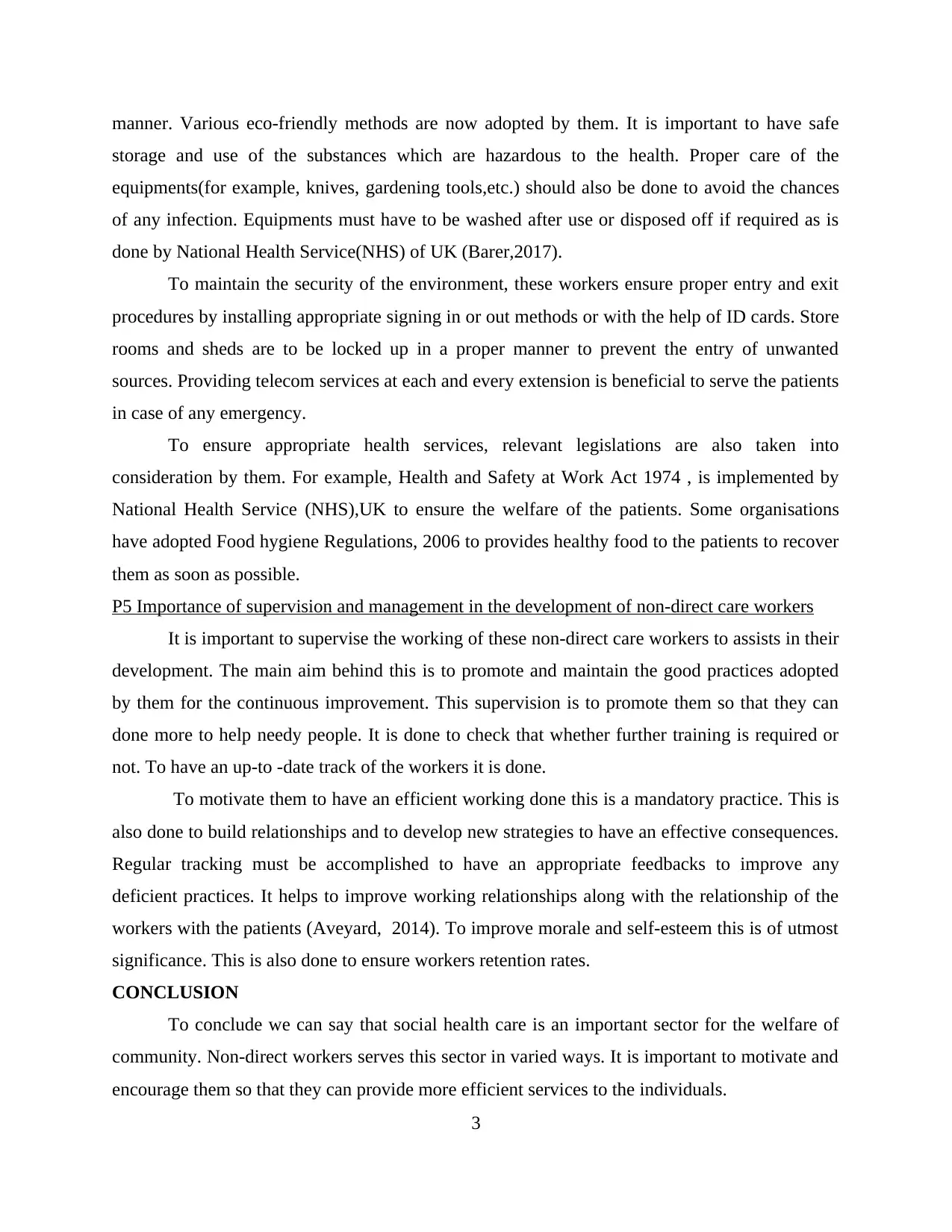
manner. Various eco-friendly methods are now adopted by them. It is important to have safe
storage and use of the substances which are hazardous to the health. Proper care of the
equipments(for example, knives, gardening tools,etc.) should also be done to avoid the chances
of any infection. Equipments must have to be washed after use or disposed off if required as is
done by National Health Service(NHS) of UK (Barer,2017).
To maintain the security of the environment, these workers ensure proper entry and exit
procedures by installing appropriate signing in or out methods or with the help of ID cards. Store
rooms and sheds are to be locked up in a proper manner to prevent the entry of unwanted
sources. Providing telecom services at each and every extension is beneficial to serve the patients
in case of any emergency.
To ensure appropriate health services, relevant legislations are also taken into
consideration by them. For example, Health and Safety at Work Act 1974 , is implemented by
National Health Service (NHS),UK to ensure the welfare of the patients. Some organisations
have adopted Food hygiene Regulations, 2006 to provides healthy food to the patients to recover
them as soon as possible.
P5 Importance of supervision and management in the development of non-direct care workers
It is important to supervise the working of these non-direct care workers to assists in their
development. The main aim behind this is to promote and maintain the good practices adopted
by them for the continuous improvement. This supervision is to promote them so that they can
done more to help needy people. It is done to check that whether further training is required or
not. To have an up-to -date track of the workers it is done.
To motivate them to have an efficient working done this is a mandatory practice. This is
also done to build relationships and to develop new strategies to have an effective consequences.
Regular tracking must be accomplished to have an appropriate feedbacks to improve any
deficient practices. It helps to improve working relationships along with the relationship of the
workers with the patients (Aveyard, 2014). To improve morale and self-esteem this is of utmost
significance. This is also done to ensure workers retention rates.
CONCLUSION
To conclude we can say that social health care is an important sector for the welfare of
community. Non-direct workers serves this sector in varied ways. It is important to motivate and
encourage them so that they can provide more efficient services to the individuals.
3
storage and use of the substances which are hazardous to the health. Proper care of the
equipments(for example, knives, gardening tools,etc.) should also be done to avoid the chances
of any infection. Equipments must have to be washed after use or disposed off if required as is
done by National Health Service(NHS) of UK (Barer,2017).
To maintain the security of the environment, these workers ensure proper entry and exit
procedures by installing appropriate signing in or out methods or with the help of ID cards. Store
rooms and sheds are to be locked up in a proper manner to prevent the entry of unwanted
sources. Providing telecom services at each and every extension is beneficial to serve the patients
in case of any emergency.
To ensure appropriate health services, relevant legislations are also taken into
consideration by them. For example, Health and Safety at Work Act 1974 , is implemented by
National Health Service (NHS),UK to ensure the welfare of the patients. Some organisations
have adopted Food hygiene Regulations, 2006 to provides healthy food to the patients to recover
them as soon as possible.
P5 Importance of supervision and management in the development of non-direct care workers
It is important to supervise the working of these non-direct care workers to assists in their
development. The main aim behind this is to promote and maintain the good practices adopted
by them for the continuous improvement. This supervision is to promote them so that they can
done more to help needy people. It is done to check that whether further training is required or
not. To have an up-to -date track of the workers it is done.
To motivate them to have an efficient working done this is a mandatory practice. This is
also done to build relationships and to develop new strategies to have an effective consequences.
Regular tracking must be accomplished to have an appropriate feedbacks to improve any
deficient practices. It helps to improve working relationships along with the relationship of the
workers with the patients (Aveyard, 2014). To improve morale and self-esteem this is of utmost
significance. This is also done to ensure workers retention rates.
CONCLUSION
To conclude we can say that social health care is an important sector for the welfare of
community. Non-direct workers serves this sector in varied ways. It is important to motivate and
encourage them so that they can provide more efficient services to the individuals.
3
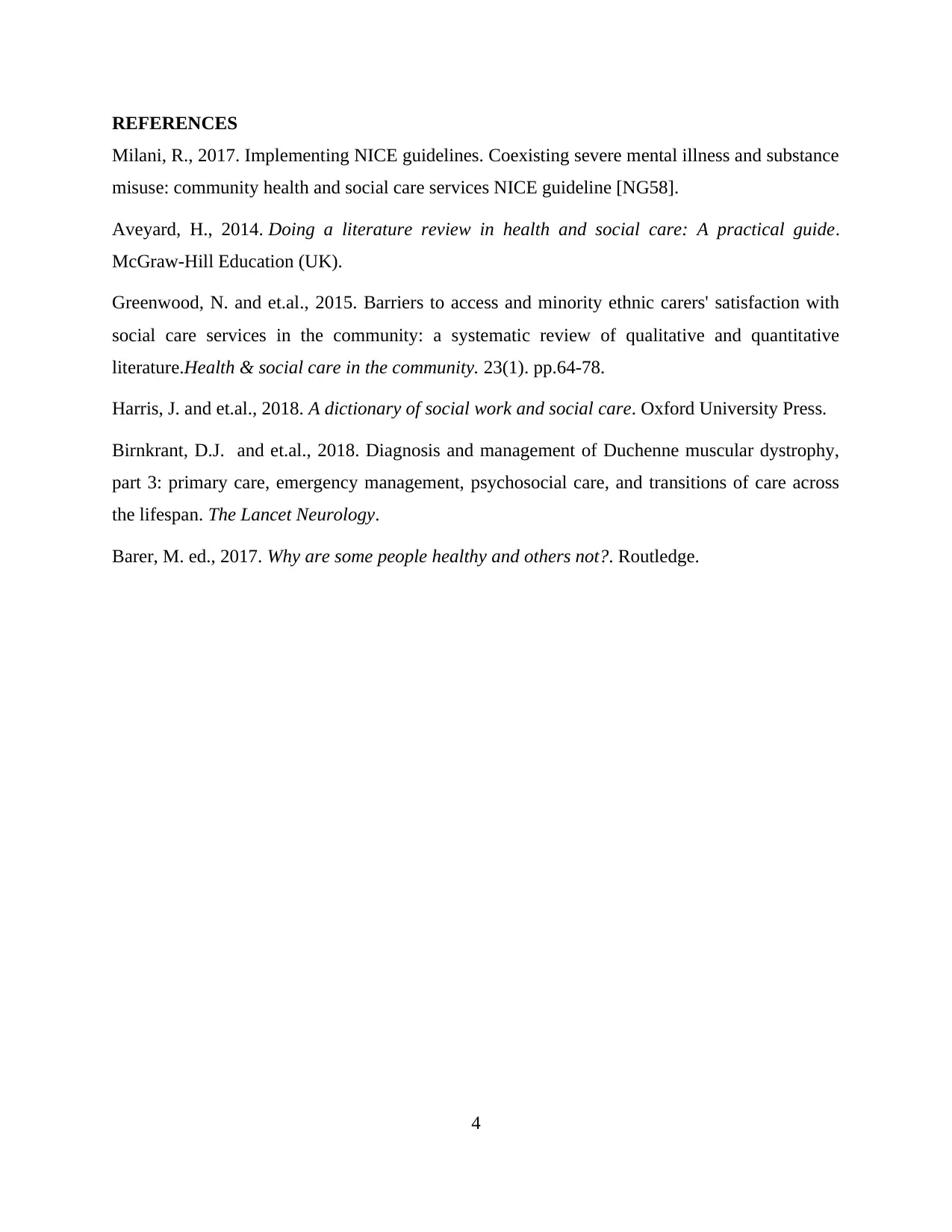
REFERENCES
Milani, R., 2017. Implementing NICE guidelines. Coexisting severe mental illness and substance
misuse: community health and social care services NICE guideline [NG58].
Aveyard, H., 2014. Doing a literature review in health and social care: A practical guide.
McGraw-Hill Education (UK).
Greenwood, N. and et.al., 2015. Barriers to access and minority ethnic carers' satisfaction with
social care services in the community: a systematic review of qualitative and quantitative
literature.Health & social care in the community. 23(1). pp.64-78.
Harris, J. and et.al., 2018. A dictionary of social work and social care. Oxford University Press.
Birnkrant, D.J. and et.al., 2018. Diagnosis and management of Duchenne muscular dystrophy,
part 3: primary care, emergency management, psychosocial care, and transitions of care across
the lifespan. The Lancet Neurology.
Barer, M. ed., 2017. Why are some people healthy and others not?. Routledge.
4
Milani, R., 2017. Implementing NICE guidelines. Coexisting severe mental illness and substance
misuse: community health and social care services NICE guideline [NG58].
Aveyard, H., 2014. Doing a literature review in health and social care: A practical guide.
McGraw-Hill Education (UK).
Greenwood, N. and et.al., 2015. Barriers to access and minority ethnic carers' satisfaction with
social care services in the community: a systematic review of qualitative and quantitative
literature.Health & social care in the community. 23(1). pp.64-78.
Harris, J. and et.al., 2018. A dictionary of social work and social care. Oxford University Press.
Birnkrant, D.J. and et.al., 2018. Diagnosis and management of Duchenne muscular dystrophy,
part 3: primary care, emergency management, psychosocial care, and transitions of care across
the lifespan. The Lancet Neurology.
Barer, M. ed., 2017. Why are some people healthy and others not?. Routledge.
4
⊘ This is a preview!⊘
Do you want full access?
Subscribe today to unlock all pages.

Trusted by 1+ million students worldwide
1 out of 6
Related Documents
Your All-in-One AI-Powered Toolkit for Academic Success.
+13062052269
info@desklib.com
Available 24*7 on WhatsApp / Email
![[object Object]](/_next/static/media/star-bottom.7253800d.svg)
Unlock your academic potential
Copyright © 2020–2026 A2Z Services. All Rights Reserved. Developed and managed by ZUCOL.





